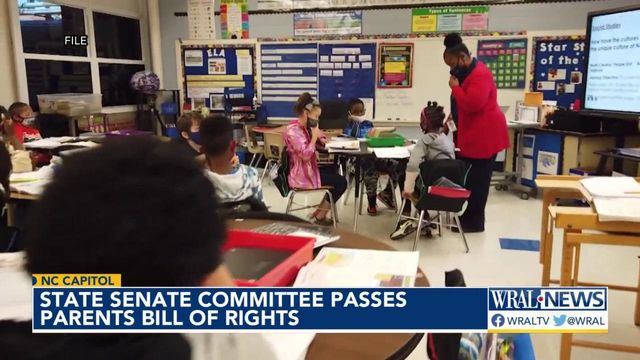Bill limiting what teachers can say about sexuality, gender advances despite opposition from parents, students
The bill could require teachers to facilitate discussions about gender identity with a questioning student's parents, except for when the teacher believes such a disclosure would lead to abuse.
Posted — UpdatedA key state Senate committee passed a bill Wednesday that would limit the discussion of gender and sexuality in elementary schools, and push teachers to tell parents when a student of any age questions their sexuality.
During a hearing before the Senate Education/Higher Education Committee, bill sponsors said the proposed legislation enables parents to be more involved in school policies. Opponents argued that privacy elements of the bill would be dangerous for students whose households might not be accepting of a child questioning their sexuality.
The committee's advancement of the bill is a key early step in the passage process. It will next be heard by the Senate Committee on Health Care.
There’s also a new section requiring parental consent before students are given surveys that ask questions about mental problems, political affiliations, “sex behavior or attitudes” or criticisms of family members.
“Parents do not surrender their children to government schools for indoctrination opposed to the family's values," Sen. Amy Galey, one of the bill’s sponsors, said during a Wednesday press conference before the committee meeting. "... Parents have the duty and responsibility to raise their own children according to their own cultural social and religious beliefs."
The bill would also require schools to make all their curriculum materials available to parents for examination, and get parental consent for students to be surveyed including details about what questions they will be asked.
The committee allowed public comments at the meeting. The majority were opposed to the bill.
"The cruelty is the point," Raleigh resident Charlie Burnett told the committee. "... This will further stigmatize LGBTQ+ students and educators and lead [to] even higher rates of depression, anxiety and suicide among them."
Critics have raised concerns about that portion of the bill, saying it would keep students — including students whose parents might punish them for being gay or for questioning their gender — from confiding in teachers. And others say that provision could be dangerous for some students, whose parents might not be accepting.
"Parents are not a safe place for many queer children," Karen Ziegler, an LGBTQ advocate, said during the public comment session. "Kids get beat up by their parents and they often get thrown out as young teenagers to live on the streets."
Republican lawmakers backing the bill say schools shouldn't keep secrets from parents, but this version of the bill enables teachers to keep private student sexuality disclosures when they believe it would lead to abuse at home.
School employees who encourage children to withhold information from their parents could be subject to disciplinary action, though, according to the bill.
Much of the bill focuses on parental rights, many of which are already in current law. And the bill lays out various notice requirements. For example, the bill says schools must let parents inspect all textbooks and instruction materials, and that schools must have a process for parents to object to those materials.
This year the bill faces similar legislative math, but with a potentially crucial difference: Republicans continue to control both legislative chambers, but by wider margins. They’re one seat short of a veto-proof majority in the House, something House Speaker Tim Moore, R-Cleveland, has predicted GOP lawmakers can overcome, allowing them to pass laws regardless of Democratic Gov. Roy Cooper’s vetoes.
Related Topics
• Credits
Copyright 2024 by Capitol Broadcasting Company. All rights reserved. This material may not be published, broadcast, rewritten or redistributed.






